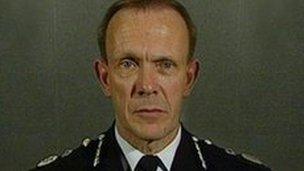Don't legalise drugs, says former Grampian police chief
- Published

Dr Ian Oliver is against legalising drugs
A retired Scottish police chief has spoken out against the legalisation of drugs.
Dr Ian Oliver said all drugs, including prescription and over-the-counter medicines, are "potentially dangerous".
A police officer for 37 years, Dr Oliver served as Chief Constable of Grampian having previously held the same post in Central Scotland.
He has written extensively on the subject and works as a consultant after leaving the police in 1998.
He said: "Increasingly the assertion is made that international drug control policies have failed and the best solution would be to legalise drugs so that they would be controlled and distributed safely through Government authorised outlets, thus denying the trade to criminal traffickers."
High-profile
Dr Oliver, an independent consultant to the United Nations Office on Drugs and Crime, added: "Regrettably, these assertions are often made by self-appointed groups with grand sounding titles which have their own reasons for supporting legalisation.
"Frequently, high-profile people claim legalisation is the best way of addressing a major social problem without cogent supporting evidence. The data used and distributed is inaccurate but presented to impress people who believe it must be true because it is published by such impressive sounding organisations and respected 'celebrities'."
He added: "The truth is that all drugs are potentially dangerous including prescription and over-the-counter medicines unless taken under medical guidance and supervision.
"International organised crime has capitalised on drug trafficking to the point where the money generated often exceeds the GDP of many countries.
"Traffickers spread false information aimed at convincing gullible people that drugs are safe 'recreational' and fun; it has to be remembered it is the demand for drugs that has made trafficking so profitable."
Since leaving the police service in 1998 he has worked as a consultant.
Writing in The Herald newspaper he takes issue with those who claim "drug control is an abuse of human rights which should allow all people freedom of choice".
He continued: "The purpose of any effective drug policy should be to lessen the harm that illegal drugs do to society. Lowering or eliminating current legal and social restrictions that limit the availability and acceptance of drug use would have the opposite effect.
"Any Government policy must be motivated by the consideration that it must first do no harm. There is an obligation to protect citizens and the compassionate and sensible method must be to do everything possible to reduce dependency and misuse, not encourage or facilitate it."
He concluded: "Criminals will not stop their crimes, change course and become honest tax-paying citizens if drugs were legalised. International drug control is working; fewer than 6% of people globally use drugs regularly and legalisation is not the answer."
- Published8 May 2013
- Published7 February 2013
- Published14 January 2013